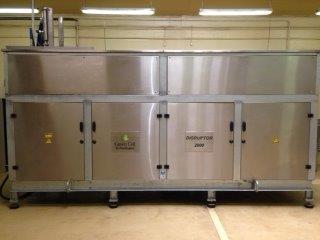Green Cell Technologies Defining our Future - will it be Feast or Famine?
June 12, 2015 (PRLEAP.COM) Lifestyle News
June 12, 2015 - Increasing 'Food Productivity™, not generating more GM foods, is the way to avoid future food shortages says Roy Henderson, CEO of Green Cell Technologies (GCT).For it or against it, we all have a strong opinion in the intense debate around the safety of, and even necessity for, Genetically Modified (GM) foods. Whatever side of the equation you sit on, the common denominator is the need to secure nutritious and meaningful sustenance for the earth's booming population.
Whereas way back in antiquity, people made the most of what they had and stored leftovers for a rainy day, today's consumerism has tended towards wastefulness and little to no provision for those potential hard times. While this attitude affects most industries, one of the biggest culprits and certainly the most influential on our future health and wellness, is the food-manufacturing sector.
Instead of developing ways to process produce better, faster, cheaper, healthier and deal with the 10 - 40% of waste and losses as a result of current archaic manufacturing methods, we have been led down a path that has yet to prove itself as a long-term safe and viable provider – GM foods. But the fact is it isn't necessary to alter the genetic make-up of a plant to bolster its properties. There is in reality a far easier, and quicker solution to generating more and better food, right now.
Eight years in the making, rigorously tested and now commercially available, Dynamic Cellular Disruption (DCD) through the Disruptor Series of machines, can effectively tackle food wastage, provide for today and help set-aside for tomorrow.
It requires a paradigm shift in thinking, because the DCD process uses the entire product, (in plants that would include the seeds, skin, even leaves and in grapes for example, the stalks). In the blink of an eye, DCD turns organic plant material used for foods (and natural medicines and cosmetics), into fully nutritious and flavour enhanced emulsions/juices (including no sugar added beverages). These can be used in a myriad of economical and beneficial applications. It processes ALL of the material including the sections of produce we are currently throwing in the bin. That's a staggering and immediate 10 - 40% increase in yield.
Because it is rapid, does not use harmful heat or chemicals, the DCD'd produce retains all the natural, medicinal and health benefits of the original source. It does not alter or denature the molecular make-up of the original cell content of the product in anyway. This pioneering process breaks down raw material into constituent parts by splitting the cells open, releasing the molecules and disrupting the insoluble fibre into minute particles.
Using the GCT proprietary drying process, these 'disrupted' emulsions can also be dried to stable and nourishing powders. These can be stored and then re-constituted in times of need such as food shortages or where people are affected by natural disaster and wholesome dietary intervention is immediately required.
Henderson said: "To feed ALL the 7 billion people inhabiting earth, we need a radical change in the food processing industry. Our focus should be on averting global food wastage, increasing food productivity™ and natural abundance. Because DCD also amplifies the nutritional quotients in produce, it is critical we focus on implementing do-able ways to ensure food security to avoid future famine in the here and now, not arguing over the safety of GM foods and waiting for tomorrow for them to be declared fit."
Henderson has already gone on record as saying that the food waste from retail can still be beneficial – even after the sell by date. "Approximately 10 billion kilograms per annum in SA alone is being dumped either during production, or because of expiry dates or weather damage," he said. "Crops damaged by hail, for example, are often left to rot on the tree or bush. All that produce can be DCD'd, converted into a nutritive powder and stored for a rainy day."
GRAS vs Food Productivity
While GM foods might not be an issue in the end, it takes time and testing to see if they can achieve GRAS (Generally Regarded As Safe) status. Typically that requires a 30-year period with no reported incidents. "That is a lot of time we don't have. Rather than playing God by modifying plants and animals, we should relook at improving food processing and use what we already have, but better," says Henderson.
"We have defined Food Productivity™ as being the immediate release of 100% of the nutritional source – making our existing produce work smarter not harder or differently. This is vital for the sole reason that we actually eat to 'fuel' our bodies to sustain life, not eat to feel full. Being full does not necessarily mean fuelled.
Henderson, never shy to dream big, concludes by providing a glimpse into Utopia: "DCD has the potential to be the advisor the world is looking for to guide it away from imminent global famine to that of a reduced, but more nutritious feast of a different kind, one more commensurate with the future we would like to create. Once we (man) use all of what we already produce, we may even find that we actually do not have a need for GM foods."
Now that would certainly disrupt the market……
About Green Cell Technologies
Green Cell Technologies is a global bio-technology and Intellectual Property development company specialising in formulating and building advanced solutions to world nutrition sustainability.
With a growing population and shrinking agricultural footprint, people are hungry and sick. Green Cell Technologies (GCT) overcomes the threat to food productivity through the use of its patented Disruptor machines and Dynamic Cellular Disruption (DCD) processes, which it sells under license to manufacturers and processors around the world. www.greencelltechnologies.com
Attachments
